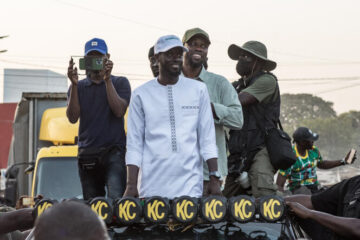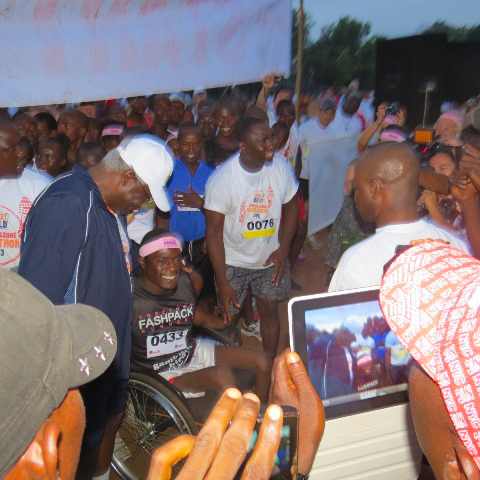Breaking News: In Sierra Leone 434 died of Cholera in 48 hours

 Between Tuesday and Wednesday last week 434 people died of cholera reported cases in Sierra Leone according to sources at the Ministry of Health and Sanitation. There have been 23, 748 recorded cases of cholera nationwide. Many are under the impression that cholera is being spread because people are dirty or unclean but this isn’t true. The real problem is that most people in Sierra Leone and Freetown especially don’t have access to toilets. They shit where they live in gutters, plastic bags, and for the thousands who live in the cities coastal slums they go in the water by the embankments just next to their shacks. So if one person has diarrhea the whole community is at risk
Between Tuesday and Wednesday last week 434 people died of cholera reported cases in Sierra Leone according to sources at the Ministry of Health and Sanitation. There have been 23, 748 recorded cases of cholera nationwide. Many are under the impression that cholera is being spread because people are dirty or unclean but this isn’t true. The real problem is that most people in Sierra Leone and Freetown especially don’t have access to toilets. They shit where they live in gutters, plastic bags, and for the thousands who live in the cities coastal slums they go in the water by the embankments just next to their shacks. So if one person has diarrhea the whole community is at risk
Cholera is a water-borne disease caused by in taking tiny amounts of feces from someone who already has it. The disease itself doesn’t kill, rather victims die of dehydration caused by diarrhea. The raining season in Freetown’s over populated slums, and poor areas are prime breeding grounds for cholera. The city council, and NGOs had done little to service the slums over the years. But for the most part those in the slums are viewed as unwanted miscreants making an eye sore of the coastline. So add the lack of toilets, the rain, government neglect and the communal cooking and sharing of food during the just concluded month of Ramadan you have a cholera epidemic and a ‘humanitarian crisis’
The Ministry of Health, according to officials, is being supported by MSF Belgium, DFID, UNICEF, and other international health stakeholders. Under DFID the British government had pledged funds to help fight the disease. The government of Sierra Leone has set up a presidential task forces headed by Dr Kaifala Marah the Chief of Staff to help raise funds and tackle the disease. The outgoing Minister of Health Mrs Zainab Bangura has been in the media advicing citizens to carry Oral Rehydration Salt (ORS) and to live in clean environments .
Meanwhile a woman who sells foo-foo at Portee Market Isatu Koroma, died and left behind two children. Her husband Mohamed who also sells at Portee said they were home when his wife fell ill and was rushed to the Rokupa Government Clinic where she died from cholera complications. But that’s how cholera is…it is swift.
Doctors Without Borders reports that they gave 143,000 cholera vaccines to those in the coastal regions in Guinea mid-May this year as preventative measures for those at risk there. This was done under the auspices of Guinea’s Ministry of Health. Makes you wonder how many lives could have been saved in Sierra Leone had our own government health organ been proactive at the start of the rain season. Both Guinea and Sierra Leone had cholera outbreaks in 2007.
– Additional reporting by Alpha B. Kamara in Freetown














the figures in this article are wrong.
Umaru,
Story was reported from Freetown by a local reporter I can not totally vouch for them. What are the numbers you’ve got. Thanks.
These numbers are alarming and i think the article needs revision. The official figure as of now is 250 fatality and about 12,000 cases as per UNICEF. WHO, MOHS and other key development partners.
My reporter in Freetown Alpha B Kamara sent this comment via email in response the questions on validity of the statistcs: [Thursday at the Government press briefing higher reports of cases were called (more than 20,000), now imagine the fatality in a country you know very well.
I will never file materials I am not sure about. The figures are correct…unfortunately they are not made public in Sierra Leone. I got the figures from an official in the ministry (and who is an insider at the Task Force’, he even promised to give me recent details. The figures are presently the ones being use to tackle the problem. According to protocols, he is not expected to disclose the informationand if I make known his identity..there is the possibility for him to lose his job. – Alpha B Kamara in Freetown email: bedohh@gmail.com]
Are you sure your figures are correct? Can you state your source?
Anyone in their right mind will know that the official figures are mostly if not always understated due to various reasons such as: time lag, saving face, but most importantly UNREPORTED DEATH in S/L. Now you can add yours to the list after giving the issue some thought, it will be good for you.
Hello to my fellow citizen !!!Unbelieveale, a country after war loose thousands of innocent people..IT seam the government dont care about the nation any mores..How many forgin aids entering that country every single day ?, where all the money for our natural resource goes to ? ( their fuckin pocket)SIERRA LEONE IS IN A BIG MESS !!!COLERA & MALARIA Why the government dont tackle this problem ? Is that a big deal for the government to solve ? COME ON GUYS OPEN YOUR EYES , & make a move for better changes…No wounder why collera kills so many people in sierra leone cos the country looks like a dump, no good water to drink ,lack of medicine,and so on…un saluda cordial desde de VIZCAYA X
Umara Fofanah appeared on the BBC World Service program “From Our Own Correspondent” recently [first time I’ve heard him on this flagship program, so congrats to him] and gave his commentary on the epidemic. Though I’m not a fan of his vocal delivery style, he made the very interesting observation that in most countries, an epidemic of this nature would likely have a significant impact on the re-election campaign of a sitting president. Clearly, public health policy falls under Koroma’s responsibility. But according to Fofanah, the cholera doesn’t seem to be making the slightest dent in Koroma’s popularity.
Is this a reflection of a Sierra Leonean attitude that death is beyond human control (how often do you hear someone say they will die on the day that God has marked for them)? Or do people just want light, water, and roads too much to care if 500 people die from a disease that doesn’t even exist in most countries anymore?